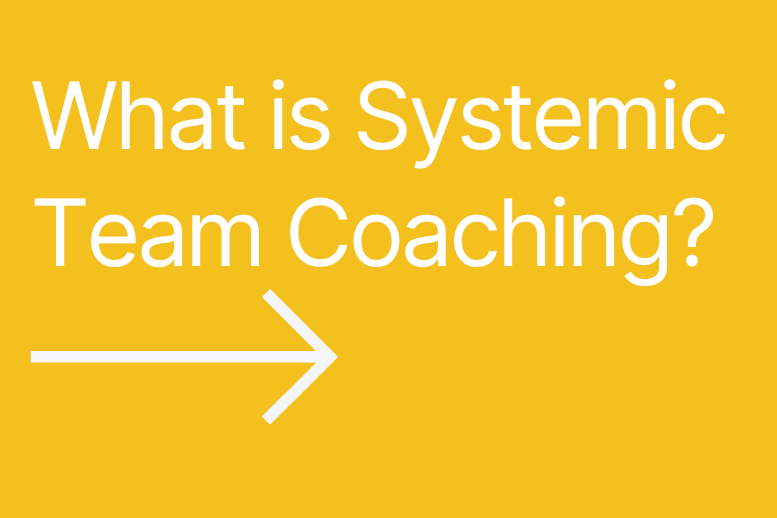
BLOG
Inspiration and news
What is Systemic Team Coaching?
You can coach brilliant individual leaders and still have a team that struggles to align, adapt, or deliver together. Here’s why Systemic Team Coaching is the missing link and why I’m training as a Systemic Team Coach.
Why the future belongs to teams that can think and act as connected systems, not just collections of talented individuals.
Picture this: A leadership team of capable individuals, each successful in their own right, sits in yet another strategy meeting that feels like it's going nowhere. They're debating the same priorities they discussed last month. Decisions get made, then somehow unravel in implementation. They're stuck in patterns that limit their collective impact.
Sound familiar? This scenario plays out in meeting rooms everywhere, and it points to a fundamental gap in how we develop leadership capability.
I’ve coached many brilliant leaders, founders and managers; coaching gives them space to pause, reflect, and reorient around what matters most, and it builds self-aware, confident and capable leaders.
But I’ve noticed something vital: traditional one-to-one coaching and leadership development aren’t enough. You can build brilliant individual leaders, and still end up with a team that struggles to align, adapt, or deliver impact across the wider business.
Organisations and teams are part of a complex system: customers, colleagues, board members, investors, stakeholders, and the political or economic climate. So if we want organisations to be successful, we need teams who can lead together, with clarity of purpose, shared ownership, and the ability to engage with the world around them.
The challenge isn't individual capability. It's that modern business challenges require systemic thinking and collective leadership that traditional approaches simply don't develop.
Systemic Team Coaching®
Systemic Team Coaching® shifts the focus from "How can we work better together?" to "What are we here to achieve together, and how do we engage with our wider ecosystem to make it happen?"
Why it matters now
We’re operating in a world that’s volatile, complex and fast-moving. Leaders are juggling competing priorities, navigating constant change, and doing more with less.
Remote and hybrid working has fundamentally altered how teams function. The informal conversations that once created alignment have disappeared. Teams need more intentional ways to stay connected, not just to each other, but to the stakeholders they serve.
Traditional team coaching is often focused on internal dynamics, things like roles, meetings, or communication. That still matters, but it’s not enough. Teams need to be thinking systemically:
Who are we here to serve? (Stakeholders)
Why are we here? (Purpose)
What value are we here to create?
What do our stakeholders need from us right now?
How do we need to work together and with others to deliver that value? (Collective performance)
What is Systemic Team Coaching?
Systemic Team Coaching® isn’t just about fixing team relationships or getting through a to-do list more efficiently. Instead of asking, “How can we get better at working together?” the team begins asking, “What do we exist to do and how can we lead together to do it well?”
It’s a shift that results in clearer priorities, greater ownership, stronger collaboration, and better decisions that are aligned to the needs of the business and the people it serves.
Peter Hawkins defines it as:
“A process by which a team coach works with a whole team, both when they are together and when they are apart, in order to help them improve both their collective performance and how they work together, and also how they develop their collective leadership to more effectively engage with all their key stakeholder groups to jointly transform the wider business.”
Outside In and Future Back Approach
Traditional team development works inside-out: start with team dynamics, then hope better internal relationships create better external outcomes. Systemic team coaching works outside-in and future-back.
Outside-In: Start with stakeholder needs and work backwards to team capability.
Future-Back: Begin with the future you're creating together, then align present actions
This approach fundamentally changes the questions teams ask:
Instead of: "How can we communicate better?" Ask: "What do our stakeholders need from us, and how do we need to communicate to deliver that?"
Instead of: "How do we resolve this conflict?" Ask: "What does this tension tell us about competing stakeholder needs, and how do we navigate that systemically?"
Instead of: "How do we make better decisions?" Ask: "What decisions would best serve our shared future and stakeholder ecosystem?"
The Five Disciplines of High-Performing Teams
The Five Disciplines Model, developed by Peter Hawkins, offers a practical framework for how systemic team coaching works. It supports teams to develop in five key areas:
Commissioning - Clarifying the team’s purpose and mandate, why it exists and who it’s here to serve.
Clarifying - Agreeing on roles, responsibilities, shared goals and success measures.
Co-Creating - Improving the quality of relationships, trust, communication and collaborative working within the team.
Connecting - Engaging with key stakeholders, internally and externally, to understand their needs and create real value.
Core Learning - Reflecting on performance and ways of working, and continuously learning together as a team.
Why I’m training in Systemic Team Coaching®
This year, I have noticed more clients who want to improve team effectiveness because of poor communication, lack of collaboration and accountability, low levels of psychological safety. So I’ve chosen to train in Systemic Team Coaching®, led by Professor Peter Hawkins and Renewal Associates. Although, I’d developed my own framework and programme for working with teams, I’m building on that to support whole teams to be more connected, aligned and impactful.
We support teams to explore their context and system: the organisation, the strategy, the customer, the stakeholders and the outside world. This involves:
Define or clarify their shared purpose and what they’re there to deliver
Strengthen trust, openness, and psychological safety
Surface and explore unspoken tensions or assumptions
Create better ways of working together
Engage with their stakeholders to ensure they’re adding the right kind of value
Hold each other to account in healthy, productive ways
Develop shared leadership, not just strong individuals
Build a team culture that reflects their values and supports results
This might involve a combination of workshops, team coaching sessions, one-to-one conversations, stakeholder input, and practical tools to embed learning between sessions. I draw on systemic team coaching principles, Peter Hawkins’ Five Disciplines model, and years of real-world experience working with leadership and cross-functional teams.
Let’s talk about your team
If you're curious about how Systemic Team Coaching could help your team become more connected, effective, and future-ready, let’s chat.
You can read more about my team effectiveness work here, or get in touch to explore what might be possible.
Email: polly@pollyrobinson.co.uk
Call: 07966 475195

